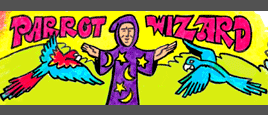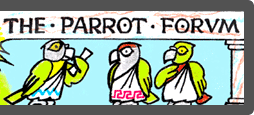To give you some background, My husband and I adopted a 2-year-old male Senegal parrot about 2 weeks ago. We had no prior experience with birds but we did A LOT of research before we adopted one.
When we first brought Darwin home, he came out of his cage right away but did not want us to get close to him. Over the course of a couple of days, he allowed us closer and we taught him to step-up on a dowel. It looked like he had not been taught step-up before and was quite uncomfortable doing so at first. He did get comfortable with it fairly quickly (a couple of days) and began stepping up on our fingers when we asked him to. He now knows 'step-up', 'turn-around', 'wave' and 'target' quite proficiently.
Darwin is flighted. He voluntarily rides around on our shoulders, flies to where we are to check things out/get treats, and sleeps on us when we watch tv in the evenings. This tells us that he likes us and that our bond is growing. Darwin is a great little bird and we love him.
Darwin has however bitten me twice and bitten my husband twice in the time we have had him. We believe that all of the bites were due to fear and not aggression (we moved too fast or sent confusing signals). He has some phobic tendencies- he is wary of new things that are introduced to his environment and does not like his body being touched. He likes beak scratches and allows us to scratch his head for a few seconds at a time but he is not at all comfortable with us trying to touch the rest of his body with our hands (he does allow us to snuggle our faces into the side of his body when he is on our shoulders which seems like a positive sign). Darwin also has a short attention span when it comes to training-5 minutes is about as much as he can handle at a time.
1. We have gotten Darwin an Aviator a flight harness and would love to be able to take him outside one day. How can we encourage him to allow us to touch his body so that we can get his harness on one day?
2. We have heard that in some cases, clipping a bird's wings (at least temporarily), can make it easier for owners to handle the bird as well as make it easier to desensitize the bird as it cannot instantly fly away, thereby learning that there is nothing to fear. Darwin has a vet appointment for beak and nail trimming. Should we get his wings clipped and try it out temporarily?
- we are very torn about this as Darwin flies away a lot which makes things difficult but at the same time we also don't want to take that choice away from him.
3. He sometimes confuses the sign for 'step-up' with the sign for 'wave', though we are no longer using the same sign for both (we point at his foot for wave and offer a finger for step-up). He waves when we signal 'step up' and then does not want to step up. He actually regressed on stepping up when we taught him to wave as he did not trust that we would pick him up. How can we clear up this type of confusion?
Thanks in advance!
~Darwin's parents~







